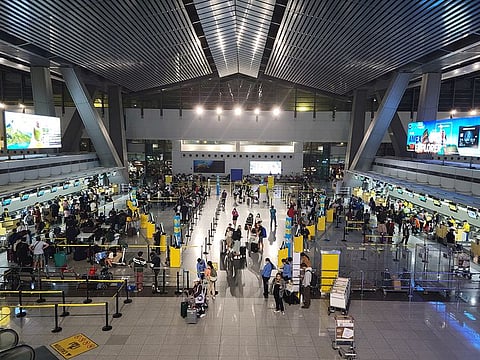Philippines visa fraud exposed: 400 foreigners blacklisted
Number only the ‘tip of the iceberg’, may exceed 1,000 amid probe into visa irregularities

Manila: Up to 400 foreigners had been blacklisted by authorities here, and the number may exceed 1,000 once an investigation into irregularities in the granting of work visas to foreigners concludes, a Philippine immigration official has said.
The blacklisting is followed by a decision to stop the issuance of visas for expatriate workers linked to companies identified as “sole proprietorships” or shell companies.
The decision was taken by the Philippines’ Department of Justice (DOJ) as the agency probes how "thousands" of work visas were approved despite the fact that visa applications were filed by suspected fly-by-nights or “potentially fake” companies.
Probe ordered
Initial findings reveal that numerous corporations seeking 9G visas are "potentially non-existent" or "fraudulent".
The Philippines' Bureau of Immigration (BI) has kicked off an audit of visa issuances covering the last five years to uncover instances of foreigners associated with fake companies.
Immigration Commissioner Norman Tansingco revealed that the recent blacklisting of over 400 foreigners was just the “tip of the iceberg”, and the number may exceed 1,000 once the investigation concludes, he told the Philippine News Agency.
As a result, Philippine Justice Secretary Jesus Remulla has ordered a comprehensive inquiry into the visa approval process for workers associated with questionable entities.
Remulla has asked the BI, the agency tasked to approve visa applications, to cease the granting visas to sole proprietorships, allowing visa approvals only for corporations validated by the Securities and Exchange Commission (SEC).
“As a matter of policy, I’m asking the BI not to grant any more visas to sole proprietorships but only to corporations that have the stamp of approval of the SEC,” the secretary was quoted as saying by Philippine media.
116 ‘potential fake’ employers
As part of the on-going probe, a total of 116 employers have been reported as “potentially fake”, according to information provided by the department.
Moreover, suspicion has also arisen involving at least 40 travel agencies and liaison officers allegedly participating in the alleged work visa racket.
Past and present BI officials
The investigation focuses on past and present BI officials who reportedly endorsed thousands of migrant worker visas linked to the fly-by-night entities.
Remulla pressed on the need to examine the accountability of officials involved in irregularities and plug the route that flouts the rules.
Scrutiny
Additionally, the official revealed that recommendations have been made for the issuance of show-cause orders against four BI officials believed to be connected to the scheme.
The department is also now considering proposals for the abolition of the visa “task force” within the agency’s Legal Division.
The move underscores DOJ’s commitment to curb irregularities, thus ensuring accountability within the implicated entities.
9 (G) visas: Pre-arranged employment visa
The prevalent work visa in the Philippines is the 9 (G) visa, commonly referred to as the "Pre-arranged Employment Visa." This visa category facilitates the hiring of foreign nationals by employers in the Philippines, particularly those possessing skills, qualifications, and experience that may be scarce within the country. The issuance of the 9 (G) visa falls under the BI. A 9 (G) visa is applied through an employer’s sponsorship. Therefore, securing a job with a Philippines-based company is a prerequisite. Further, applicants are also required to obtain an Alien Employment Permit (AEP) before securing a 9 (G)-work visa. As a rule, a 9 (G) holder may only work for the company that has sponsored his/her work visa. In the case of a change of employer, the 9 (G) status is downgraded to a tourist visa, and foreign workers are required to make a new work visa application. A 9 (G) is valid for an initial period of one, two, or three years, and can be extended up to three years at a time, depending on the duration of the employment contract. The validity, however, cannot exceed the period granted under the AEP issued by the Department of Labor and Employment (DOLE). The 9 (G) visa can be renewed multiple times.
Sign up for the Daily Briefing
Get the latest news and updates straight to your inbox



